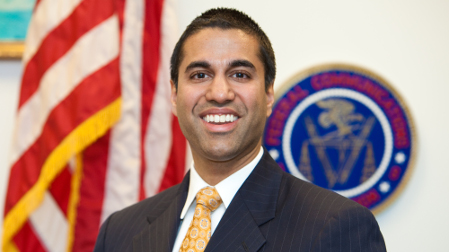FCC Chairman Elaborates on Broadcast Incubator, Steps To Bridge Digital Divide
WASHINGTON—FCC Chairman Ajit Pai relied on an out-of-this-world quote to describe how his agency is addressing the real-world lack of diversity in the communications industry during remarks presented today at the MMTC 9th Annual Broadband and Social Justice Summit in Washington, D.C.

“To borrow from Yoda in ‘The Empire Strikes Back,’ ‘Try not. Do, or do not. There is no try.’ Much wisdom in that statement there is,” said Pai.
Pai was referring to action the FCC took in November 2017 to advance a broadcast incubator program, something he described as “a personal priority” since 2014, he told his audience at the Multicultural Media, Telecom and Internet Council gathering. Last fall, the agency adopted a Notice of Proposed Rulemaking seeking advice on how to put the program together and implement it.
“Our goal is to develop an incubator program that will help address barriers to station ownership, such as lack of access to capital and the need for technical experience—and for these solutions to increase broadcast ownership diversity,” he said.
The NPRM asks for information on topics, such as the criteria to be eligible to benefit from the program, appropriate activities of the incubator, what benefits should be available and how the program should be reviewed, monitored and enforced, said Pai.
The FCC chairman also discussed “a repugnant practice” of certain advertisers that “exclude minority focused media outlets from their ad campaigns through a so-called ‘No Urban/No Hispanic’ dictate,” he said.
While former FCC Commissioners Jonathan Adelstein and Robert McDowell and the American Association of Advertising Agencies (4As) “led the charge” against the practice, which resulted in the 4As adopting a “non-discrimination policy frame” and a review process for media complaints in 2011, the practice appears to have “arisen again,” said Pai. The 4As again have worked to end discriminatory practices and will today announce its Fair Play policy, which asks charter media agencies “to recommit to fair and equitable treatment of minority media owners,” he said.
Get the TV Tech Newsletter
The professional video industry's #1 source for news, trends and product and tech information. Sign up below.
Pai began his address by acknowledging the role MMTC has played as “one of the most respected and thoughtful voices in our community.” He described MMTC as “a key advocate” for many FCC policies enacted over the past year. For example, MMTC supported the agency discontinuing its local broadcast main studio rule. While some opponents “called this an attack on localism,” MMTC pointed out that the rule’s staffing requirements acted as an impediment to minority broadcasters from entering markets “by putting significant financial burdens” on them, he said.
He also recognized MMTC as a long-time proponent of Class C4 FM stations, a new class of stations that could increase power of hundreds of Class A stations. On Feb. 5, the Media Bureau released an NPRM on Class C4 FM stations. Pai noted that MMTC has backed authorization because it could help small and minority-owned stations to obtain the capital they need and strengthen their market position.
Pai also told MMTC that he has reconstituted the FCC’s Diversity Committee, which has the primary mission of developing recommendations on ways to empower disadvantaged communities and accelerate the entry of small businesses, including minority- and women-owned entities, into media and digital industries.
However, the place where the missions of the agency and MMTC most closely align is in closing the digital divide, he said. “Every American who wants high-speed Internet access should be able to get it,” said Pai.
The FCC’s Broadband Deployment Advisory Committee (BDAC) weeks ago submitted findings and recommendations to the commission aimed at bridging the divide. Pai called the BDAC’s report “a valuable contribution to our efforts to promote expanded availability of wired and wireless broadband.”
Pai closed his comments by recalling the words of abolitionist and social reformer Frederick Douglass, which he said “still resonate today.” Douglass’s words “[s]ome know the value of education by having it. I know its value by not having it” are echoed in an “opportunity gap in the digital age,” said Pai.
Pai seeks to change the circumstance where those “on the wrong side of the digital divide” do not have the “full ability to educate their kids,” find high-quality health care, become entrepreneurs, engage civically in their local communities “and otherwise better their lives,” he said.
Phil Kurz is a contributing editor to TV Tech. He has written about TV and video technology for more than 30 years and served as editor of three leading industry magazines. He earned a Bachelor of Journalism and a Master’s Degree in Journalism from the University of Missouri-Columbia School of Journalism.

